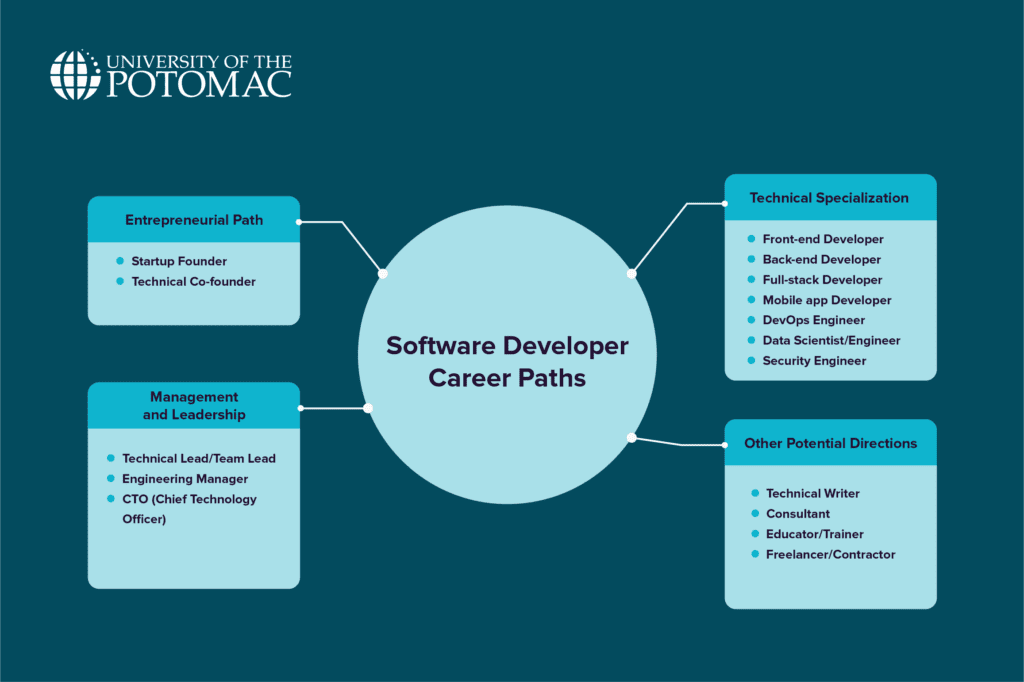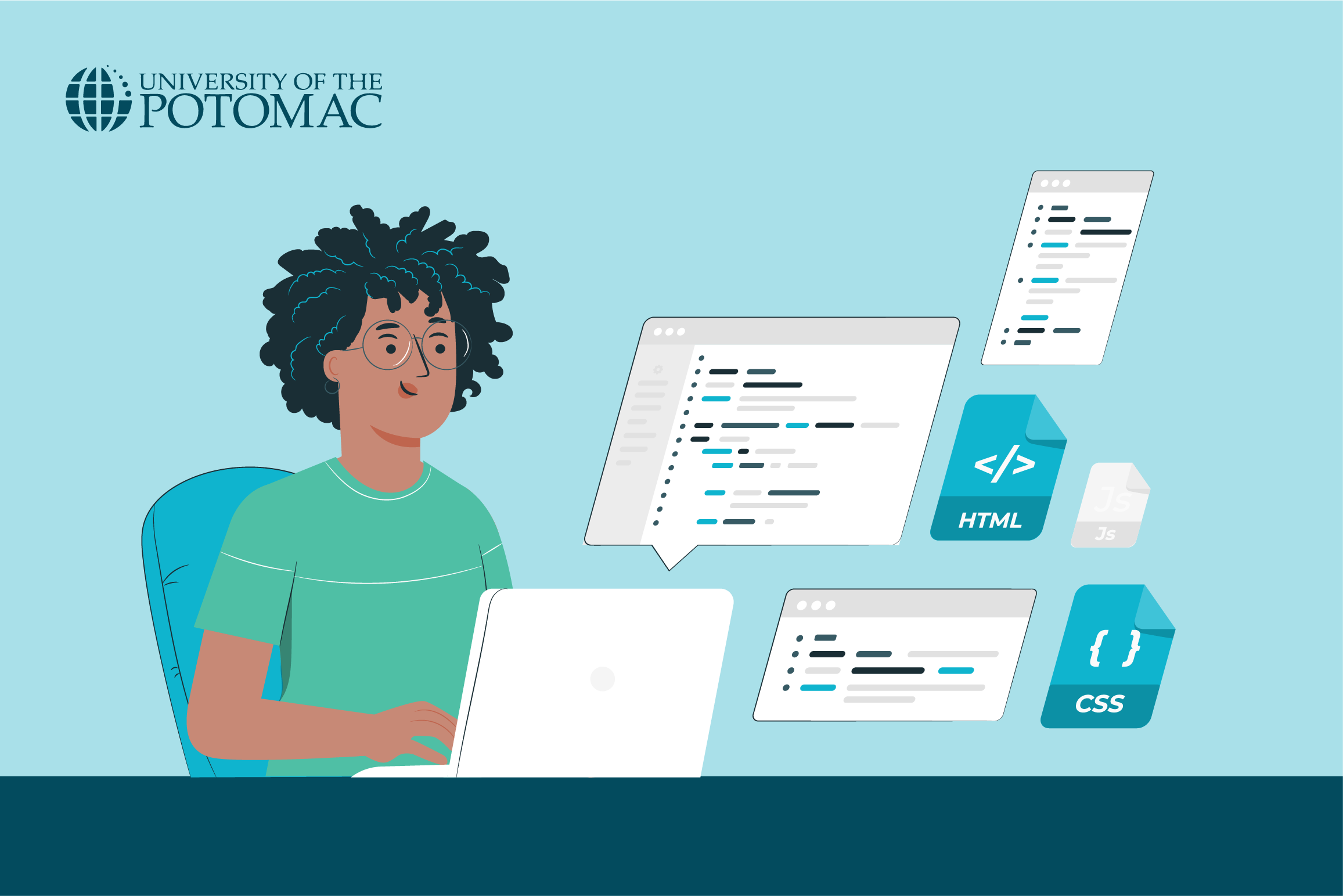From the apps on our phones to the software that runs businesses and everything in between, many of the digital tools we rely on daily are the handiwork of software developers. These innovations are not the result of a single kind of professional managing every aspect but rather the collective efforts of various specialists in software development. Each developer brings their unique expertise, from front-end design to back-end infrastructure, contributing to the end product.
What we learn from this is that a significant amount of work and collaboration goes into software development and that there are numerous software developer career paths available. So, read on as we explore these opportunities within software development—where every line of code is a step toward the future.
What Is a Software Developer?
A software developer is an expert who is responsible for the design, creation, testing, and maintenance of software applications or systems. These applications can vary from straightforward mobile apps to intricate systems that manage networks or devices.
Software developers utilize a variety of programming languages, tools, and methodologies to address problems and develop user-friendly solutions that meet specific requirements. They collaborate closely with stakeholders, including clients, project managers, and fellow developers, to comprehend the requirements and ensure the end product meets those expectations.
Software Developer Career Paths

The career paths available to software developers are diverse and plentiful, catering to various interests and skill sets. Here, we explore some of the main avenues for software developers and provide a look at potential career trajectories.
Technical specialization
Software developers can specialize in specific technical areas, allowing them to become experts in particular fields. This specialization can significantly influence their career trajectory and opportunities for advancement.
Front-end developer
Front-end developers are web developers who focus primarily on the client side of applications. This means they work on everything users interact with directly, including the layout, design, and interactivity of websites or web applications.
They often collaborate with designers to translate visual designs into functional code. They are responsible for ensuring the website is responsive and works well on various devices and screen sizes.
Back-end developer
Back-end developers handle the server-side logic and database management of applications. They build and maintain web applications’ core functionality, including creating APIs, managing databases, and ensuring the server, application, and database communicate effectively.
These professionals focus on performance, security, and scalability, ensuring that the application can handle a growing number of users and data. They also implement business logic and algorithms, ensuring the application meets the required specifications and performs efficiently.
Full-stack developer
Full-stack developers are a blend of the first two, as they have expertise in both front-end and back-end development. They are versatile professionals who handle all aspects of web development.
These developers use a combination of front-end and back-end technologies, allowing them to work on complete projects independently or lead a team of specialized developers.
Mobile app developer
As the name suggests, mobile app developers specialize in applications for mobile devices. They often work on creating intuitive and engaging user experiences, leveraging the unique features of mobile devices, such as touchscreens, cameras, and sensors.
DevOps engineer
These engineers bridge the gap between development and operations teams. They implement practices and tools to automate and streamline the software development process, ensuring faster and more reliable releases.
These professionals are responsible for maintaining the infrastructure and ensuring that applications are scalable, secure, and performant. They often work on automating repetitive tasks, monitoring system performance, and managing cloud services.
Data scientist/Engineer
Data scientists and engineers specialize in working with large volumes of data to extract meaningful insights and build data-driven applications.
Data scientists focus on analyzing data, creating machine-learning models, and deriving actionable insights. Data engineers, on the other hand, focus on building and maintaining the infrastructure required for data storage, processing, and retrieval.
Security engineer
Security engineers focus on protecting applications and systems from cyber threats. They work on identifying vulnerabilities, implementing security measures, and ensuring compliance with security standards and regulations.
Management and leadership
For those who aspire to take on leadership roles within their organizations, there are also various management and leadership positions in software development that offer a path to guide and influence development teams and technological strategies.
Technical lead/Team lead
A technical lead or team lead is the person responsible for overseeing a team of developers and their projects. They provide technical guidance, help resolve complex issues, and act as a bridge between the development team and higher management.
Because of the responsibilities associated with the role, strong technical skills, excellent communication, and leadership abilities are required.
Engineering manager
An engineering manager manages the engineering team and its projects, handling people management and technical oversight. They are responsible for their team members’ recruitment, performance evaluations, and career development.
Additionally, they ensure that engineering practices and processes are efficient and align with the company’s goals. This role combines technical expertise with strong managerial and interpersonal skills.
CTO (Chief technology officer)
The CTO is a senior executive responsible for an organization’s overall technology strategy. They oversee the development and implementation of technological solutions that drive the company’s success.
A CTO must have a deep understanding of both the business and technical aspects of the organization, providing visionary leadership to ensure the company stays at the forefront of technological innovation. This role demands extensive experience in technology and strategic planning.
Entrepreneurial path
Pursuing an entrepreneurial path can be incredibly rewarding for those who desire to build something from the ground up and have a knack for innovation.
Startup founder
A startup founder is someone who initiates and establishes a new business, often focusing on innovative technology solutions. This role involves everything from ideation and product development to business strategy and fundraising.
Founders must be versatile, resilient, and willing to take risks. They need a strong understanding of both technology and business to turn their vision into a successful company.
Technical co-founder
A technical co-founder is a founding member of a startup who is primarily responsible for the technical aspects of the company. They work alongside the business-focused co-founders to develop the product, manage the technical team, and ensure that the technology aligns with the business objectives.
This role requires the ability to collaborate closely with other founders in order to drive the company’s growth.
Other potential directions
Lastly, software developers can also explore a variety of other career paths that leverage their technical skills in unique and impactful ways.
Interested in pursuing a degree?
Fill out the form and get all admission information you need regarding your chosen program.
This will only take a moment.
Message Received!
Thank you for reaching out to us. We will review your message and get right back to you within 24 hours.
If there is an urgent matter and you need to speak to someone immediately you can call at the following phone number:
- We value your privacy.
Technical writer
A technical writer creates documentation, guides, and manuals that explain complex technical information in a clear and accessible manner. This role is essential for helping users understand how to use software products and developers to understand technical standards and processes.
Consultant
Consultants provide expert advice to organizations on specific technical challenges and projects. They leverage their extensive knowledge and experience to help clients implement solutions, improve processes, and achieve their technical goals.
Educator/Trainer
Educators and trainers in the field of software development teach and mentor aspiring developers, either in academic settings, through bootcamps, or via online platforms. They design curricula, deliver lectures, and provide hands-on training to help students build their skills. This role is ideal for those who enjoy sharing their knowledge and helping others succeed in their careers.
Freelancer/Contractor
Freelancers and contractors work independently, offering their development services to various clients on a project-by-project basis. This career path provides flexibility and the opportunity to work on a diverse range of projects.
How To Start a Career in Software Development? General Requirements
Starting a career in software development involves meeting several general requirements that set the foundation for a successful journey. Some key elements needed to embark on this path include:
Education
Education is a fundamental step in becoming a software developer. Most professionals in this field hold a bachelor’s degree in software engineering, computer science, or a related discipline.
For those seeking a quicker entry into the field, diploma programs offer intensive, short-term programs focused on specific skills related to the field and hands-on experience.
Essential skills and knowledge
In addition to formal education, one must also acquire specific software developer skills. Proficiency in programming languages like Java, Python, C++, and JavaScript is crucial.
Understanding software development tools and frameworks, version control systems, and the best practices in coding and software design is also important. Problem-solving abilities, logical thinking, and the capacity to work well in teams are some of the most essential soft skills for a successful career in software development.
Career advancement
Career advancement in software development involves continuous learning and professional growth. Developers can pursue advanced degrees or certifications to specialize in areas such as cybersecurity, data science, or mobile app development.
Gaining experience through internships, personal projects, and open-source contributions can enhance your resume. Networking with other professionals, attending industry conferences, and staying updated with the latest technological trends can also provide career growth and progression opportunities in this field.
The Bottom Line
Whether you sparked an interest in software development early on in school when you were first introduced to programming languages and wrote your first “hello world” program or discovered it later as you became more acquainted with the digital world, the field of software development is vast enough to offer something for everyone. From coding enthusiasts to digital innovators, there’s a place for every passion and skill level.
If you’re ready to pursue this field, consider joining Potomac’s Software Developer Diploma Program. It equips you with the knowledge and skills needed to excel in various software development career paths and turn concepts into creations.
Frequently Asked Questions (FAQs)
Is a software developer an IT job?
Yes, a software developer is considered an IT job. Software developers create and maintain the applications and systems that run on computers and other devices, making them integral to the information technology field.
Is software development a good job?
Software development is often regarded as a good job due to its high demand, competitive salaries, and opportunities for innovation and creativity. It also offers diverse career paths and the potential for remote work and flexible schedules.
Is being a software developer hard?
Being a software developer can be challenging due to the need for continuous learning and problem-solving skills. However, many find the work rewarding because of the ability to create impactful software and the satisfaction of overcoming technical challenges.
Do software developers make money?
Yes, software developers typically earn good salaries, with an average total pay of $130,426 per year. Their income can vary based on experience, specialization, and location, but the demand for skilled developers generally ensures competitive compensation.










